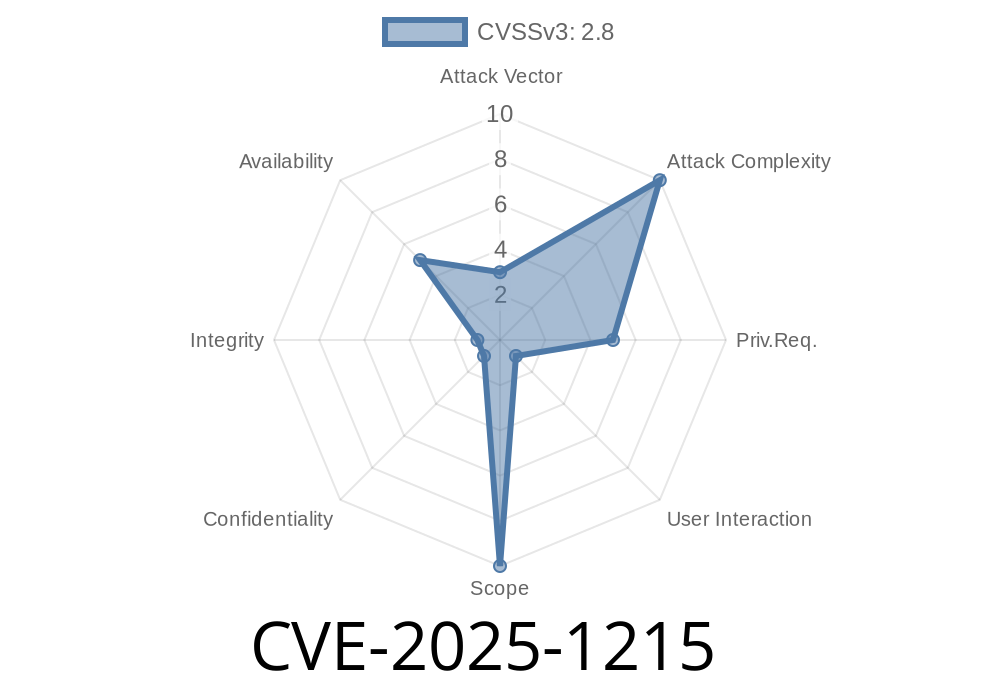Vim, the popular text editor used by developers and sysadmins around the world, has recently been found to have a security issue tracked as CVE-2025-1215. This vulnerability could allow an attacker to corrupt memory on your system, potentially paving the way for more serious attacks. In this post, we’ll break down what happened, who’s affected, how you can check your Vim installation, and the simple fix to keep your system safe.
What Happened?
Security researchers discovered that Vim (up to version 9.1.1096) does not safely handle input data for the --log argument when starting from the command line. Specifically, an internal issue in the src/main.c file makes it possible to cause memory corruption just by passing improperly crafted arguments to Vim.
How Does the Exploit Work?
Attackers can craft a command line that takes advantage of Vim’s unsafe handling of the --log argument. By providing a “bad” input, they can overwrite memory in Vim’s process space.
Below is a simplified example to show how the argument could trigger the bug. For demonstration, let’s use a fake exploit–the real one may be more complex.
# Example of potentially malicious use (DO NOT RUN ON PRODUCTION)
vim --log=$(python3 -c 'print("A" * 10000)')
In vulnerable versions, this can cause Vim to overrun a buffer, possibly crashing or behaving unpredictably.
The Affected Code
While the specific lines are deep in Vim’s source, here’s a pseudo-snippet to explain the issue conceptually:
// src/main.c (simplified)
if (logarg)
{
char buf[1024];
strcpy(buf, logarg); // Unsafe copy, no length check!
// ... use buf for logging
}
If logarg is longer than the buffer, memory past buf gets overwritten.
> Real code may differ, but this illustrates the idea.
How Was This Fixed?
The fix landed in commit c5654b84480822817bb7b69ebc97c174c91185e9, which does two things:
Here’s how a safe version could look
if (logarg)
{
char buf[1024];
strncpy(buf, logarg, sizeof(buf) - 1);
buf[sizeof(buf) - 1] = '\'; // Make sure it's null-terminated
}
Who Is Affected?
Everyone using Vim up to and including 9.1.1096 is exposed. The problem is fixed in Vim 9.1.1097.
Just open your terminal and run
vim --version
Look at the first line for something like VIM - Vi IMproved 9.1 (2024 Apr 13, .... If it says anything below 9.1.1097, you should upgrade.
Upgrade Vim to at least version 9.1.1097. Here’s how (example for Ubuntu/Debian)
sudo apt update
sudo apt install vim
Alternatively, download and build from Vim’s official Github.
More Information & References
- Official Patch Commit
- CVE Record at MITRE (placeholder)
- Vim’s Github Security Advisories
- Vim’s Releases
Summary
CVE-2025-1215 is a memory corruption vulnerability that can be triggered with Vim’s --log argument on affected versions. It’s easy to fix by upgrading to Vim 9.1.1097 or later. Don’t wait—update your Vim install today to stay secure.
Stay safe and patch early!
*This post is original and tailored for simple, practical understanding. Please reference official sources for full technical and security details.*
Timeline
Published on: 02/12/2025 19:15:10 UTC
Last modified on: 02/12/2025 20:15:39 UTC
